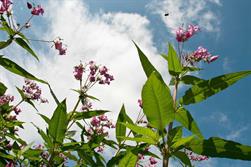Invasive Non-Native Species Group
Invasive Species
Invasive Non-native Species (INNS) are plants, animals, fungi and microorganisms which have been introduced to parts of the world where they would not naturally be found. They have the ability to spread causing damage to the environment, the economy, our health and the way we live. INNS are the second greatest threat to biodiversity after habitat loss and fragmentation. INNS have been estimated to cost the UK economy at least £1.8 billion pounds annually, they mainly affect farming and horticultural sectors but can affect transport, construction, recreation, aquaculture and utilities.
Wales Invasive Non-native Species Group
The Wales Invasive Non-native Species Group was formed to help identify INNS priorities and resolve issues relevant to Wales. The group acts as a source of expertise on INNS in Wales. The group generally meets three times a year. It’s work programme is focused on action under 5 key topic areas – promoting action, raising awareness, sharing best practice, information exchange and expertise. Membership includes representatives from Wales Biodiversity Partnership, Academia, GB Non-Native Species Secretariat, Local Authorities, Natural Resources Wales, Public Health Wales, Wales Environment Link, Welsh Government, the Welsh Local Government Association and Utility companies.
To get in touch with the group please contact us.
Great Britain Invasive Non-native Species Strategy
The GB Invasive Non-native Species Strategy provides a framework on how to minimise the risks posed by INNS. The strategy sets out key aims and actions for addressing the threats posed by INNS.
Action is taking place across Wales and GB by various groups, projects and organisations to help reduce the risks and impacts associated with invasive non-native species.
There are a number of Local Action Groups active in Wales tackling invasive species including the Dee Invasive Non-Native Species Project. The project is a catchment-wide partnership initiative which aims to coordinate the control and monitoring of invasive non-native species (INNS) within the Dee catchment to ensure a joined-up approach to INNS management is delivered.
The Wales Invasive Non-Native Species Group maintains a list of Priority Species for Action in Wales. This list can be used to help focus action on INNS in Wales. Species are listed under three categories – prevention priority species (those not yet in the wild but likely to arrive), management priority species (those present in the wild in low numbers) and long-term management priority species (those established in the wild)
Non-native species records help us understand how many INNS species are present in Britain, and the rate at which they are spreading. Everyone can provide useful biological records of non-native species, and with the development of online recording sites and smartphone apps it is now easier than ever. Sightings of INNS should be reported in accordance with GB Non-native Species Secretariat guidance.
Some species are highly invasive and are classed as ‘Alert Species’. It is particularly important to report these species if sighted.
View the distribution of Invasive Non-native Species of interest to Wales on the National Biodiversity Network Atlas Wales – InvasiveNon-Native Species (INNS) Portal.
The INNS Portal includes over 300 terrestrial, freshwater and marine species of interest to Wales and allows species occurrences and distribution to be searched for and downloaded individually or collectively by list. Species include those listed under EU and national legislation and those of policy and practical interest, including those identified as Wales Priority Invasive Non-Native Species for Action by the Wales Biodiversity Partnership INNS Group.
Biosecurity is about lowering the risk of introducing or spreading INNS (and other harmful organisms such as disease) in the wild.
When visiting sites with water follow these steps:
- CHECK all clothing and equipment
- CLEAN clothes and equipment on site
- DRY thoroughly dry equipment and clothing
WaREN promotes biodiversity and ecosystem resilience through the development of a collaborative and sustainable approach to the management of invasive non-native species (INNS) across Wales.
In its developmental phase, supported by Welsh Government funding, WaREN achieved several key actions including:
- Engagement with stakeholders such as Local Action Groups to gather information on INNS projects to identify gaps, barriers and opportunities for collaboration
- Analysis of INNS impacts and distribution in Wales
- Scoping of a variety of toolkits and action recording tools
A WaREN Project Board has been established with membership including Welsh Government, Natural Resources Wales, Wildlife Trust of South and West Wales, Welsh Water, Wales Biodiversity Partnership and North Wales Wildlife Trust (lead organisation). The GB Non-Native Species Secretariat and land managers sit on the Board as special advisors. The purpose of the Project Board is to provide governance and aid decision making.
WaREN II is funded by the Welsh Government Sustainable Management Scheme and will now build on the success of the development phase. This innovative project will provide opportunities to collectively work together by increasing engagement, participation and co-operation with a wide range of public, private and third sector stakeholders, including Local Action Groups.
The project will have a real impact on effectively addressing the problem of INNS on the environment, economy and wellbeing of people in Wales.
How to get involved? We are keen to engage with organisations, businesses and community groups with an interest in INNS and will be holding a series of regional workshops. Please get in touch with us via email or for more information click here.
- INNS Meeting Minutes October 2023
- INNS Meeting Minutes March 2023
- INNS Meeting Minutes November 2022
- INNS Meeting Minutes March 2022
- INNS Meeting Minutes October 2021
- INNS Meeting Minutes March 2021
- INNS Meeting Minutes October 2020
- INNS Meeting Minutes March 2020
Minutes from previous WBP INNS meetings (from 2011 onwards) are available upon request. Please contact walesbiodiversitypartnership@cyfoethnaturiolcymru.gov.uk if you require these.














